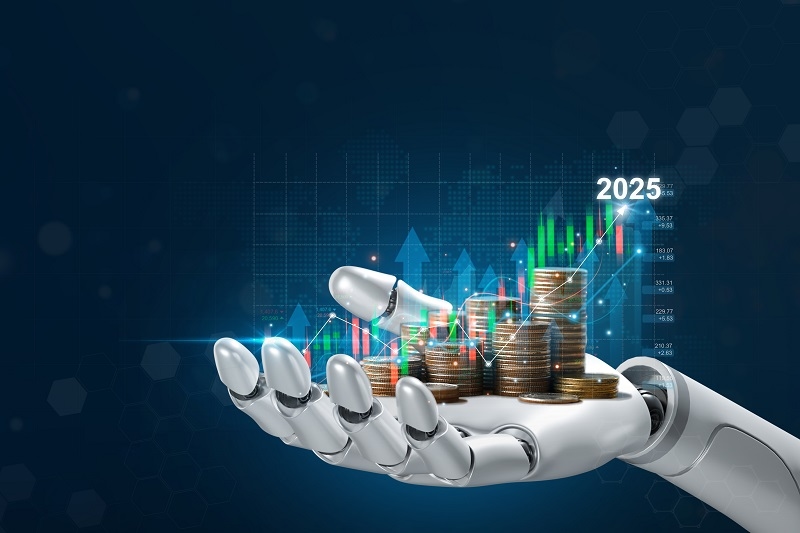
Artificial Intelligence (AI) transformation is transforming the way things are done, and finance is no exception. In 2025, AI in the financial market is not only a trend, but it is a transformation. From auto trading to automated financial advice, AI is simplifying decision making, enhancing performance, and minimizing risk to both the investor and the business. In this blog, we are going to discuss how artificial intelligence in the financial sector is developing humane, quicker, and safer markets in various parts of the world.
AI is not limited to simple automation. In 2025, it will define the essence of the work of financial markets.
Artificial intelligence in the 2025 financial market is the use of intelligent computer applications that have the potential to learn and evolve to make well-informed choices; in most cases, they are happening quicker and more precisely than human beings. These analytics have the capability of handling large data and forecasting market trends, which enables investors to make forecasts.
Financial institutions will have invested extremely heavily in AI by 2025. The AI has become reliable due to enhanced computing capabilities, superior machine learning algorithms, and increased access to data. It is no longer optional; it is a must.
Trading has evolved thanks to AI. Algorithmic trading is now a standard practice on many stock exchanges.
Algorithmic trading uses AI to execute orders at the best possible price. These systems follow pre-set rules and analyze live market data. They can trade thousands of times a second, much faster than any human. They also eliminate emotional decision-making.
AI helps reduce human error, cut trading costs, and make faster decisions. It also allows traders to test strategies using historical data, improving accuracy before real money is used. AI can also identify hidden patterns in market behavior that humans might overlook, leading to smarter investment choices.
AI can read market trends in real-time and adjust trading strategies instantly. For example, if a sudden news event affects stock prices, AI can react within milliseconds, buying or selling before most humans even notice.
Managing risk is critical in finance. AI is now helping firms better identify and respond to potential threats.
AI tools can scan millions of transactions and spot unusual patterns that may signal fraud. Banks and financial platforms use this technology to block suspicious activities before harm is done.
AI models can forecast when the market might become unstable. They analyze historical trends, political news, economic data, and even social media to predict when prices could swing.
Regulations in the finance world are complex. AI helps institutions stay compliant by monitoring changes in laws and ensuring that company practices follow the rules. This saves time and reduces penalties.
AI has made financial services more customer-focused than ever before.
Robo-advisors use AI to create customized investment plans. By asking users a few questions about their goals and risk tolerance, they offer tailored advice without needing a human advisor.
Many banking apps in 2025 now use AI to provide insights. They can suggest ways to save money, alert you about unusual spending, and help create smart budgets.
Need help with your account at 2 AM? AI-powered chatbots and voice assistants are always available. They answer questions, handle transactions, and even offer financial tips—quickly and accurately.

Fintech companies are at the center of the AI revolution. These startups are using technology to change how we handle money.
Fintech is short for "financial technology." It includes any company using tech to improve banking, investing, payments, or lending. AI is a major driver behind most fintech solutions in 2025.
AI helps process transactions faster and more securely. Mobile payment apps now use AI to protect user data, detect fraud, and speed up money transfers.
AI can assess creditworthiness by analyzing more than just credit scores. It looks at spending habits, income patterns, and other behaviors to make lending fairer and faster, especially for those without traditional banking histories.
Managing wealth and planning for the future has become easier with AI.
AI systems can manage entire portfolios, adjusting asset allocations based on real-time market conditions. This ensures investments stay aligned with goals and risk levels.
AI can predict the performance of stocks, bonds, or even cryptocurrencies by analyzing news, market trends, and economic data. This helps both individual investors and professionals make smarter decisions.
AI also helps investors focus on ESG (Environmental, Social, and Governance) goals. It scans companies’ sustainability records, social policies, and ethical standards to guide socially responsible investments.
AI in finance isn’t perfect. It brings challenges that need thoughtful solutions.
The future of artificial intelligence in finance looks promising. AI will keep evolving, and its role in markets will only grow.
Combining AI with blockchain can create faster, safer, and more transparent transactions. This can be a game-changer for global finance and digital currencies.
International stock markets are also using AI to match trades, settle transactions, and monitor market health. This will make global investing easier and more accessible.
AI is turning into a potent assistant, but it is not going to replace financial professionals. The speed and data power that AI provides release better strategies alongside human judgment that generate better outcomes.
In 2025, artificial intelligence in the financial sector is not something of the future anymore; it is the present. AI in finance is making the industry more intelligent, high-performance, and user-friendly, starting with algorithmic trading and the fintech effect. Nevertheless, such an effective technology should be used reasonably.
It will be more important, as an investor, to follow the information and adopt new tools to remain on the edge. The issues for companies are how to make it innovative, but at the same time, safeguard privacy, fairness, and trust. Artificial intelligence in finance still holds a bright future in transforming the global economy in ways that are unknown to us as we increasingly get into the digital world.
This content was created by AI